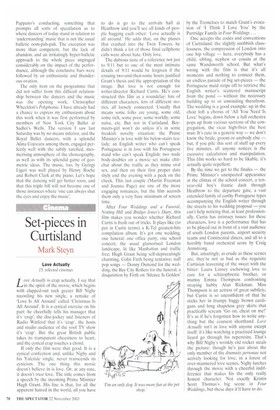Set-pieces in Curtisland
Mark Steyn
Love Actually 15, selected cinemas
IowActually is crap actually. I say that in the spirit of the movie, which begins with clapped-out rock geezer Bill Nighy recording his new single, a remake of 'Love Is All Around' called 'Christmas Is All Around'. It is a cynical exercise on his part: he cheerfully tells his manager that it's 'crap', the disc-jockey and listeners of Radio Watford that it's 'crap', the hosts and studio audience of the yoof TV show it's 'crap'. But the great British public takes its transparent cheesiness to heart, and the cynical crap touches a chord.
If only the film were that good. It is a cynical confection and, unlike Nighy and his Yuletide single, never transcends its cynicism. The one thing this movie doesn't believe in is love. Or, at any rate, it doesn't trust love. The title comes from a speech by the incoming Prime Minister Hugh Grant. His line is that, for all the apparent hatred in the world, all you have to do is go to the arrivals hall at Heathrow and you'll see all kinds of people hugging each other: 'Love actually is all around.' He adds that, on the planes that crashed into the Twin Towers, he didn't think a lot of those final cellphone calls were about hate. Only love.
The dubious taste of a reference not just to 9/H but to one of the most intimate details of 9/11 would be forgiven if the ensuing two-and-then-some hours justified Grant's thesis and the appropriation of the image. But love is not enough for writer/director Richard Curtis. He's constructed this film as a roundelay: lots of different characters, lots of different stories, all loosely connected. Usually that means some folks are young, some old, some rich, some poor, some worldly, some naive, etc. But not in Curtisland. Boymeets-girl won't do unless it's in some freakish novelty situation: the Prime Minister's in love with his below-stairs tealady; an English writer who can't speak Portuguese is in love with his Portuguese maid who can't speak English; two nude body-doubles on a movie set make chitchat about the traffic as they mime oral sex, and then on their first proper date shyly end the evening with a peck on the cheek. This last couple (Martin Freeman and Joanna Page) are one of the more engaging romances, but the film accords them only a very bare minimum of screen time.
After Four Weddings and a Funeral, Notting Hill and Bridget Jones's Diary, this film makes you wonder whether Richard Curtis is fresh out of tricks. It plays like (to put in Curtis terms) a K-Tel greatest-hits compilation album. It's got one wedding, one funeral; one office party, one school concert; the usual glamorised London landscape, lit like Manhattan and traffic free; Hugh Grant being self-deprecatingly charming, Colin Firth being tentative; naff pop songs — Donny Osmond for the wedding, the Bay City Rollers for the funeral; a disquisition by Firth on 'Silence Is Golden' by the Tremeloes to match Grant's evocation of 'I Think I Love You' by the Partridge Family in Four Weddings. .
One accepts the codes and conventions of Curtisland: the slightly snobbish classlessness, the compression of London into one hip village — here, everybody has a child, sibling, nephew or cousin at the same Wandsworth school. But what's wrong with the film is that it's all moments and nothing to connect them, an endless parade of big set-pieces — the Portuguese maid strips off to retrieve the English writer's scattered manuscript from the pond — without the necessary building up to or unwinding therefrom. The wedding is a good example: up in the choir loft a chorus of 'All You Need Is Love' begins, down below a full orchestra pops up from various sections of the congregation, the vicar high-fives the best man. It's cute in a generic way — we don't know the bride, groom or anybody else — but, if you pile this sort of stuff up every five minutes, all anyone notices is the excessive calculation and manipulation. This film works so hard to be likable, it's actually quite repellent.
By the time we get to the finales — the Prime Minister's unexpected appearance at the climax of the school concert, a tenyear-old boy's frantic dash through Heathrow to the departure gate, a vast extended family of earthy Portuguese types accompanying the English writer through the streets to his wedding proposal — you can't help noticing that, at least professionally. Curtis has intimacy issues: for these characters, love is a performance that has to be played out in front of a vast audience of south London parents, airport security teams and Continental diners, and all to a horribly banal orchestral score by Craig Armstrong.
But, amazingly, as crude as these scenes are, they're not as bad as the requisite Curtisian leavening of the sweet with the bitter: Laura Linney eschewing love to care for a schizophrenic brother, or mumsy Emma Thompson confronting straying hubby Alan Rickman. Miss Thompson is an actress of great subtlety, but Curtis is so unconfident of that he sticks her in frumpy baggy brown cardigans and long shapeless grey skirts that practically scream 'Go on, cheat on me!' It's as if he's forgotten how to write anything but the coarsest shorthand. Love Actually isn't in love with anyone except itself: it's like watching a practised lounge lizard go through his repertoire. That's why Bill Nighy's wrinkly old rocker steals the picture: though he's just about the only member of the dramatis personae not actively looking for love, in a forest of over-mannered love scenes, Nighy lurches through the movie with a cheerful indifference that makes his the only really honest character. Not exactly Kristin Scott Thomas's big scene in Four Weddings, but these days it'll have to do.


























































































 Previous page
Previous page